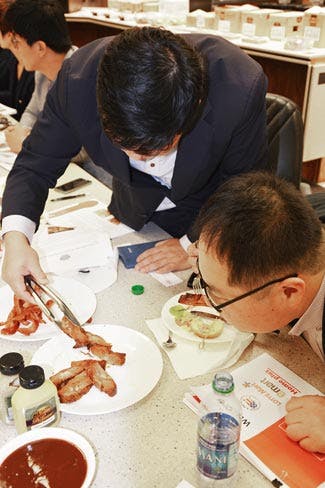Visit to U.S. Farm, Retail Stores Provide Korean Deli Team with Fresh Ideas
A group of deli and retail food managers from South Korea made their first visit to an American farm this week as part of a USMEF-led mission designed to promote the quality, safety and versatility of U.S. pork and beef. The team of representatives from Emart, Homeplus and Lottemart – three Korean retailers with strong interests in that country’s growing home meal replacement (HMR) sector – also toured a Hormel Foods plant, visited several retail outlets and attended a seminar and product sampling by Chef Jay McCarthy.

Bruce Schmoll talks about U.S. agriculture with a team of Korean retail managers visiting his farm near Claremont, Minnesota.
Click on photo for video of the Korean team’s visit to Bruce Schmoll’s farm
For the U.S. red meat industry, opportunity lies in the need for product – both processed meat and muscle cuts – to place at the center of HMR dishes in the Korean market.
A tour of the Hormel plant in Austin, Minnesota, gave the team a look at how U.S. red meat is processed, prepared and packaged for consumers. Later, a visit to USMEF President-elect Bruce Schmoll’s corn and soybean farm included a dinner featuring a variety of offerings from Schwan’s home meal delivery service.
“The idea was to show the Koreans one of the U.S. versions of HMR, so we ordered several items online and the team got a taste of beef and pork. We grilled some cuts and also served a lasagna from Schwan’s made with meat filling,” said Schmoll, who was assisted by his wife, Tarrie, and Minnesota Soybean Growers Association Director of Marketing Programs Manager Kim Nill. “I explained that there are several companies producing ready to eat and ready to heat meals here in the United States. I also explained the value and advantages of using U.S. pork and beef.”
Schmoll gave the Korean team a tour of his farm near Claremont, Minnesota, where he grows about 1,000 acres of corn and soybeans.
As a farmer serving in leadership positions with grain organizations and USMEF, Schmoll has hosted a number of international trade teams over the years. He carefully explained to the Koreans the connection between a grain producer and the U.S. livestock and red meat industries.

With the help of Tarrie Schmoll (far right), the Korean team prepares to eat dinner on their visit to the Schmoll farm
“Initially, you may not realize what a corn and soybean farmer has to do with pork and beef, but we actually rely on the livestock industry to make our own businesses successful,” said Schmoll. “We realize that the livestock producers utilize the soybeans and corn we grow to feed their animals, so growth in the livestock industry means growth for us. And creating relationships in other countries and promoting international trade spurs that growth.”
Jeongmin Seo, deputy general manager for the Homeplus deli team, was impressed with Schmoll’s operation and appreciative of his hospitality.
“No one on our team had ever been to a U.S. farm, so we all kind of imagined what it would be like – Korean farms are very, very small and our whole team was amazed just looking at the fields and countryside as we drove across Minnesota to get to Mr. Schmoll’s farm,” said Seo. “We were equally impressed that he grilled and prepared a home delivery meal, because that is the kind of thing we are learning about on our visit to the U.S.”
The Schwan’s dinner helped the Korean team relate to what they had learned earlier in the day at Hormel, said Jihae Yang, USMEF director in South Korea.

Jack Shao, international sales and marketing manager for Hormel Foods, shows the Korean team packaged U.S. pork and beef items during a review and product sampling at the company’s facility
“The Korean market has changed a lot and consumers are more and more interested in convenient meals, items they can purchase at a store and simply microwave or heat up at home in very little time,” she noted. “The home meal replacement idea is just that – a replacement for the traditional, time-consuming meal that is prepared and cooked at home in the kitchen.”

The team takes a close look at pre-cooked U.S. pork products at the Hormel tasting
At Hormel, Jack Shao, the company’s international sales and marketing manager, led the Korean team on a tour of the Austin facility, including its research and development department. Team members got a close look at the packaging of Spam, which is a very popular product in Korea. After a brief presentation on Hormel’s company history, the team was treated to a review and tasting session of Hormel’s U.S. pork and beef products that are packaged as “ready to eat” or “ready to heat.”
Shao said the Hormel plant processes more than 19,000 hogs per day and “we continue to look at our products and how we can develop them to meet the needs of consumers in many different international markets.” He pointed out during a tasting of U.S. pork bacon that Koreans tend to favor products that are less salty than Americans enjoy.
“So we take that into consideration when producing meat products for Korea and other markets with different tastes,” said Shao, who later led the team on a tour of the nearby Spam Museum.
The following day, the team visited a Hy-Vee supermarket in New Hope, Minnesota. Store managers provided insight to preparing hundreds of “meals to go” on a daily basis. Of special interest to the Koreans was how U.S. supermarkets manage volumes of deli meats and package meals in an efficient and economical fashion.
“We were curious to see how they plan and how they track inventories for the items and ingredients that go into their deli case, and specifically in the ready-to-eat meals,” said Choi Hun-Kyu, deli team manager for E-mart, South Korea’s largest retailer. “We also were interested in how they displayed and merchandised the meats in their deli cases. The goal of making those meats attractive to consumers is not easy to attain, so we wanted to see how U.S. supermarket delis do it.”
USMEF then led the Korean team to Denver, Colorado, where they toured major retailers Trader Joe’s, Target, King Soopers and Whole Foods. They also visited Tony’s Meats and Custom Made Meals, two small businesses that feature HMR items.
McCarthy’s seminar at Metropolitan State University’s Hospitality Center in Denver focused on U.S. pork and beef dishes, including barbecue and other items that can be packaged for “ready to heat” meals. McCarthy presented various packaged dishes that can be purchased at retail and shared ideas for creating others.
